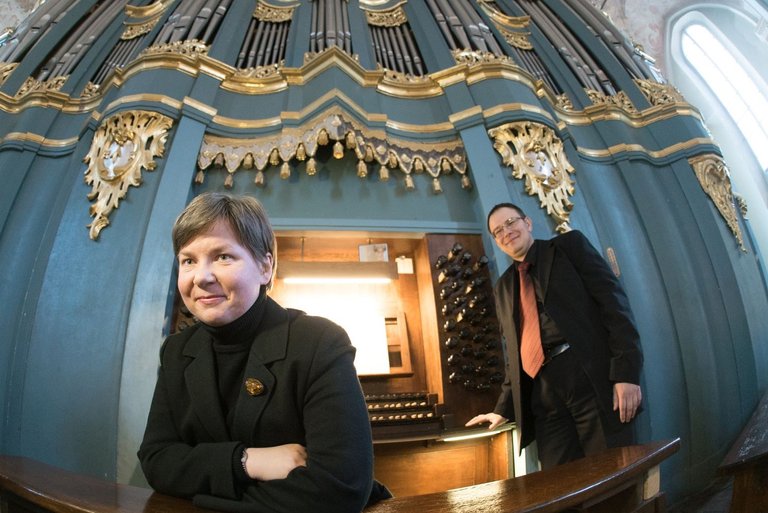SOPP511: I retired after 35 years as a Primary School Teacher and have gone back to study Organ Performance and Musicology in university
Vidas: Hi guys! This is Vidas.
Ausra: And Ausra.
V: Let’s start episode 511 of Secrets of Organ Playing Podcast. This question was sent by Fintan. And he writes:
Hi Vidas, I’m practising hard. I retired after 35 years as a Primary School Teacher and have gone back to study Organ Performance and Musicology in university. It’s hard work but I find it very useful to have fingering notated in advance when learning new repertoire. I’ve just purchased a copy of your Toccata in F, BWV 540 with fingering and look forward to learning it. Regards, Fintan
A: Well, you know, let’s congratulate Fintan that after teaching at school for 35 years, he finds strength to play the organ, to practice the organ and study organ performance and musicology at university. I think it’s amazing. Well, I’m not teaching for so many years yet, but even now, I feel so exhausted after each day at school. So it really surprises me in a good way that a person can find so much energy left after so many years of a teaching job.
V: When you were little, Ausra, what was your dream? For example, what would you like, what was your dream to become in the future? What did you want to do?
A: I wanted to be a singer.
V: Singer, right?
A: Yes.
V: Uh huh. So imagine, if you, when you retire after, I don’t know, 20 years or less, as the teacher, harmony and theory teacher, and ear-training teacher, maybe you would like to pursue this hobby again and…
A: Sing?
V: Sing!
A: You know, I think that this little bit of voice that I still have left, I think will leave my body after teaching for let’s say, 20 more years.
V: Because you are using your voice every day.
A: I know, and it leaves me right now, sometimes, in the middle of my classroom. I’m talking, and suddenly I don’t have a voice anymore. So I think I have to abandon the idea of singer’s career.
V: It’s gone?
A: Yes. I think I will be very lucky if after retirement, I can sit on the organ bench and to play a little prelude and fugue from Bach’s circle.
V: I know what you mean! But does singing still fascinate you?
A: Yes, but not that kind of singing that I wanted to pursue when I was a little kid. Because then, when I was a little kid, I was fascinated by opera singers with these huge voices. But now I’m not fascinated by that anymore. Of course, I appreciate good singers. I can understand who is who, and be able to know who is singing well and who is not singing very well. But now, I’m fascinated with early music singers that don’t project so much of the power of the voice, but can control it and sing polyphonic music, for example.
V: In a good style.
A: Yes.
V: Uh huh. I see. But if putting things aside that are stopping you, right, your voice limitations, your everyday using of your voice, right, and you understand that this is not possible for you, right?
A: Mm.
V: If is WAS possible, right, if you didn’t damage your voice, when you retire, did you, would you still have this passion for singing?
A: Of course, but like for most elderly ladies, you cannot keep your muscles very well intact, so the breathing becomes a problem, and holding your breath, and this is for singers a crucial point. So, well, I rather would not do it. Because I don’t think it would sound very nice. But of course, if I would be fascinated by everything that my physical abilities would still let me do it, then of course I guess I would do it.
V: Yeah. We, as kids, have many dreams and hobbies, and we stop sometimes them, because life gets in the way, formal education gets in the way, right? And when we grow up, we no longer have this ability to practice our hobbies. But then, somehow our hobbies from childhood catch up with us, later in life, right?
A: True.
V: Look at us now. We’re doing things that we didn’t do for many years now. Maybe the same is with Fintan. Maybe he started to play organ after he retired, right, and after he had more time to do it, and less stress as a Primary School teacher, right?
A: True. It’s like our friend Marcia Koster who raised ten kids of her own. And she went back to school when she was 60, and got her Master’s degree in organ performance. So, because, that was her dream, but she didn’t have time in her life to do it until she was 60 years old. So I guess it’s very natural. It didn’t seem very natural for us, because Vidas and I, we were raised in the Soviet Union, where people had strict rules about things. And it was really uncommon that after retirement you would begin to study something. Everybody would think that you are crazy.
V: They would think you are an idiot.
A: Yes.
V: Because if you are still learning...
A: You have some mental issues. Because why, of course you graduate from school, you graduate from university or not, but then you got a job which was assigned to you even in those days.
V: You didn’t have to choose.
A: Yes. So everything was sort of known in advance. You would know that after graduation you will receive a position. Maybe not in the capital, but somewhere in the province. And that’s it. And life will just go by.
V: Mm hm.
A: And it was really very unusual to do something like to go back to school after retirement. I don’t think as a child that I would have heard any of such stories. But now it’s sort of becoming a rule, and it’s becoming just a regular thing.
V: Yeah, it’s more common for seniors to start learning hobbies and learning new things. And we have so many students over 60 years old, right, Ausra?
A: Yes.
V: All around the world.
A: And now there’s this so-called Third Age University.
V: For seniors.
A: For seniors. And all those classrooms are just crowded with seniors. Of course, there are some areas that are more interesting for people.
V: Like medicine?
A: Yes, like all kinds of medical issues. But also, like history.
V: Yeah.
A: And every subject.
V: So seniors cannot really be put in a position with low expectations, right? Oh, you are over 60, you are no longer useful to society, and you just have to watch TV all day long and wait for the day to end.
A: And you know, I remember when I was a child, and you know, let’s say, people would retire very early in the Soviet days. Women would retire at age 55. Men, I think, at the age of maybe 60.
V: Mm hm.
A: And now we all retire at age of 65 in Lithuania. And I guess by the time that we will have to retire, we will postpone that age even. We will make it even longer. But, you know, a lady at the years of 60 would just wear a scarf on her head.
V: Mm hm.
A: And would really look very, very old. Now there is nothing like this anymore.
V: Nobody wears scarves.
A: I know. Maybe some stylish, fancy ones. But just to keep in fashion.
V: In fashion, yes.
A: But otherwise, as I remember 30 years back, when comparing our elderly people with people from west, western countries, they would be like night and day, how their seniors look like and how our seniors look like. But now our seniors look like the western seniors.
V: Maybe with less smiles.
A: Well yes.
V: Yes?
A: But still, if you wouldn’t look at the smile only about appearance. You wouldn’t recognize who’s who.
V: True. So I can only congratulate Fintan and others who decided to pick up their dream of learning organ playing at age of 50, 60 years old, sometimes 70 years old.
A: I guess he is not a beginner, he just went back to, I guess because of the piece that he purchased.
V: Yes, Toccata and Fugue in
A: F Major.
V: In F Major, BWV 540, is a very advanced piece.
A: So, that’s what I’m guessing that, you know, he played the organ, but because of the teaching, he had to stop practicing, to quit practicing. But now he has more time, so he went back to his dream.
V: Yes. And we all should pursue our dreams, or just simply do things that we are meant to do, right? Because if we don’t do it, we will feel miserable. Don’t you think, Ausra?
A: Yes, I guess we would regret it at the end of our life.
V: Yes. Thank you guys. This was Vidas.
A: And Ausra.
V: Please send us more of your questions. We love helping you grow. And remember, when you practice,
A: Miracles happen.
Check out my Secrets of Organ Playing books:
https://amazon.com/author/vidaspinkevicius


@tipu curate
Upvoted 👌
To listen to the audio version of this article click on the play image.

Brought to you by @tts. If you find it useful please consider upvoting this reply.
Thank you so much for your donation to Artstorm prizes. Good luck in retirement.